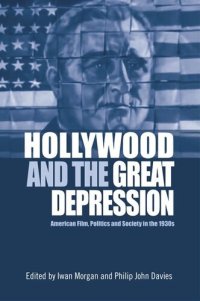
Ebook: Hollywood and the Great Depression: American Film, Politics and Society in the 1930s
Author: Iwan Morgan, Philip John Davies
- Year: 2016
- Publisher: Edinburgh University Press
- Language: English
- pdf
Examines how Hollywood responded to and reflected the political and social changes that America experienced during the 1930s
In the popular imagination, 1930s Hollywood was a dream factory producing escapist movies to distract the American people from the greatest economic crisis in their nation’s history. But while many films of the period conform to this stereotype, there were a significant number that promoted a message, either explicitly or implicitly, in support of the political, social and economic change broadly associated with President Franklin D. Roosevelt’s New Deal programme. At the same time, Hollywood was in the forefront of challenging traditional gender roles, both in terms of movie representations of women and the role of women within the studio system. With case studies of actors like Shirley Temple, Cary Grant and Fred Astaire, as well as a selection of films that reflect politics and society in the Depression decade, this fascinating book examines how the challenges of the Great Depression impacted on Hollywood and how it responded to them.
Topics covered include:
- How Hollywood offered positive representations of working women
- Congressional investigations of big-studio monopolization over movie distribution
- How three different types of musical genres related in different ways to the Great Depression – the Warner Bros Great Depression Musicals of 1933, the Astaire/Rogers movies, and the MGM ‘kids’ musicals of the late 1930s
- The problems of independent production exemplified in King Vidor’s Our Daily Bread
- Cary Grant’s success in developing a debonair screen persona amid Depression conditions
Contributors
- Harvey G. Cohen, King’s College London
- Philip John Davies, British Library
- David Eldridge, University of Hull
- Peter William Evans, Queen Mary, University of London
- Mark Glancy, Queen Mary University of London
- Ina Rae Hark, University of South Carolina
- Iwan Morgan, University College London
- Brian Neve, University of Bath
- Ian Scott, University of Manchester
- Anna Siomopoulos, Bentley University
- J. E. Smyth, University of Warwick
- Melvyn Stokes, University College London
- Mark Wheeler, London Metropolitan University